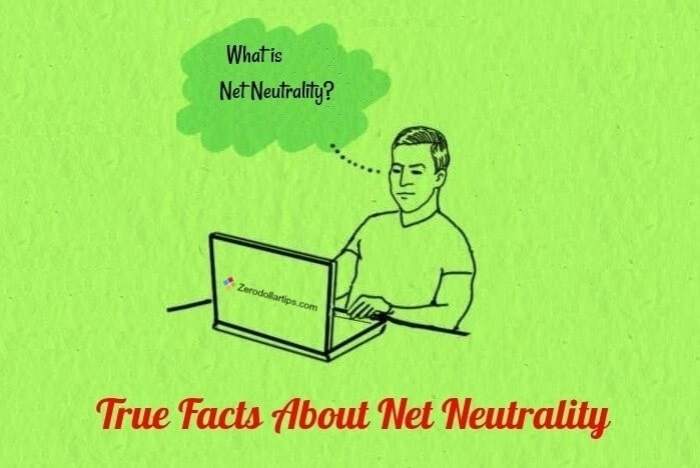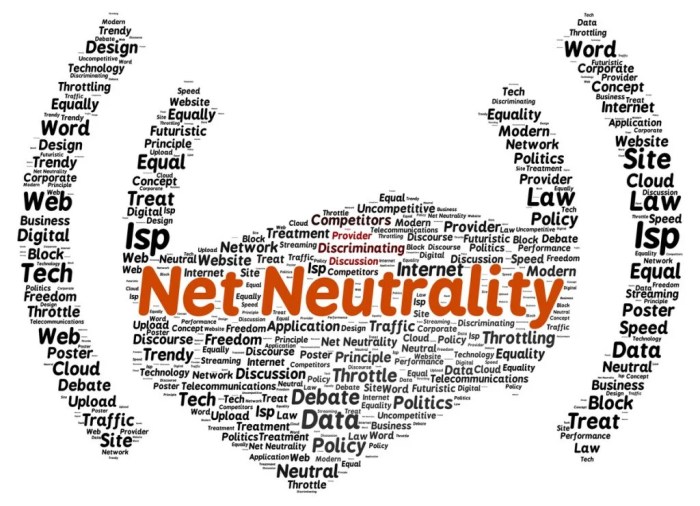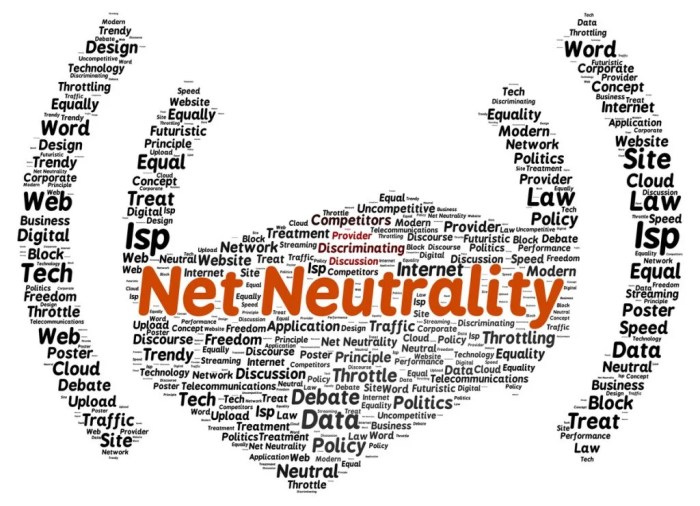Net Neutrality Bill Saving or Strangling the Internet?
Net neutrality bill saving or strangling the internet? This debate rages on, impacting everything from the speed of your connection to the innovation of the online world. Understanding the historical context, potential benefits and drawbacks, and the global perspective is crucial for evaluating the bill’s true impact. This exploration delves into the arguments, examining how it affects internet service providers, consumers, and the future of the digital landscape.
This discussion considers the historical evolution of net neutrality, from its inception to the current debates. We’ll analyze the core principles, different interpretations, and contrasting models of internet regulation. It also explores potential benefits like promoting innovation and competition, and potential drawbacks like reduced investment and higher costs for consumers. Ultimately, we’ll aim to provide a comprehensive overview that empowers readers to form their own informed opinions.
Historical Context of Net Neutrality
The debate surrounding net neutrality is a complex one, deeply intertwined with the evolution of the internet itself. It’s not a recent phenomenon, but rather a reflection of the ongoing struggle to balance innovation and access in a rapidly changing digital landscape. Understanding the historical context is crucial to grasping the arguments for and against the principle.The internet’s early days were marked by a sense of openness and shared resources.
This early ethos, however, was not codified into law, leaving the door open to potential future conflicts. The development of broadband infrastructure and the rise of internet service providers (ISPs) brought with it the potential for preferential treatment of certain online services. This potential for manipulation has fueled the ongoing debate.
Key Moments in the Net Neutrality Debate
The net neutrality debate has been a dynamic one, evolving alongside the internet itself. It’s not a simple binary, but a complex interaction of technological advancements, legal battles, and evolving public opinions.
| Date | Event | Description |
|---|---|---|
| 1990s | Early Internet Development | The internet’s initial growth was characterized by a decentralized, open structure. This era saw the emergence of various online services and the foundational protocols that shaped the internet’s architecture. This openness was not necessarily enshrined in law, leading to ambiguity about future regulations. |
| Early 2000s | Rise of Broadband and ISPs | The proliferation of broadband internet access and the consolidation of internet service providers (ISPs) brought significant changes to the internet landscape. ISPs gained more control over the infrastructure, sparking discussions about the need for regulations to ensure fair access for all users and services. |
| 2003-2009 | Initial Net Neutrality Proposals | The Federal Communications Commission (FCC) began considering net neutrality regulations. Advocates argued that without regulations, ISPs could prioritize their own services or those of favored companies, potentially hindering competition and innovation. Opponents argued that regulations could stifle innovation and investment in the internet infrastructure. |
| 2010-2015 | FCC’s 2010 Net Neutrality Rules | The FCC implemented rules enforcing net neutrality principles, defining internet access as a public utility. This was a major victory for advocates, as it aimed to ensure that all online traffic was treated equally. However, it was later challenged in court. |
| 2017-2021 | FCC Repeal of Net Neutrality Rules | The FCC under a new administration repealed the 2015 net neutrality rules. This decision was met with strong opposition from advocacy groups and internet users who argued that it would lead to discrimination and stifle competition. |
| Present | Ongoing Debate | The repeal of net neutrality regulations has spurred continued debate and advocacy efforts. The discussion continues to evolve with the rise of new technologies and services, and the need to address concerns about equitable access to the internet. New legislation and regulatory approaches are continually under consideration. |
Arguments for Net Neutrality
Net neutrality proponents emphasize the importance of a level playing field for all online content and services. They highlight the potential for ISPs to discriminate against competitors, favoring their own services or those of affiliated companies. This could stifle innovation and limit consumer choice.
“A free and open internet is essential for innovation and competition.”
Arguments Against Net Neutrality
Opponents of net neutrality argue that regulations can hinder investment in internet infrastructure. They suggest that a tiered approach to internet service—differentiating between fast and slow lanes—could lead to greater innovation and investment in the industry.
“Net neutrality regulations can stifle investment and hinder the development of new internet technologies.”
Defining Net Neutrality

Net neutrality is a fundamental principle of internet access that ensures equal treatment for all online traffic. It prevents internet service providers (ISPs) from discriminating against specific content, applications, or websites. This concept is crucial for maintaining a fair and open internet, fostering innovation, and promoting competition. Understanding its core principles and various interpretations is essential to evaluating its significance in today’s digital landscape.The core principle of net neutrality is simple: all data on the internet should be treated equally.
No data packets should be prioritized or throttled based on their source, destination, or content. This level playing field allows for the free flow of information and promotes competition among service providers and content creators. It’s like a highway where all vehicles have the same access rights, preventing one type of traffic from getting preferential treatment.
Core Principles of Net Neutrality
Net neutrality is based on a few fundamental principles. These principles aim to create a fair and open internet for everyone. First, all internet traffic should be treated equally, regardless of content, application, or source. Second, internet service providers (ISPs) should not discriminate against any type of online activity. Finally, no entity, including ISPs, should be able to block, slow down, or prioritize certain data traffic.
Interpretations and Variations of Net Neutrality
Different interpretations and variations of net neutrality exist. Some interpretations focus on preventing ISPs from blocking or slowing down specific content, while others emphasize the need for transparent and reasonable policies regarding network management. Furthermore, discussions often arise concerning the extent to which net neutrality should protect various types of online traffic, like streaming services or peer-to-peer file sharing.
This leads to debate on whether certain categories of traffic should receive preferential treatment for better performance.
Net Neutrality vs. Alternative Models of Internet Regulation
Alternative models of internet regulation often involve varying degrees of government intervention and control over network management. One such model allows ISPs to prioritize certain types of traffic, arguing that this can lead to better network performance and potentially encourage investment. However, this approach could potentially stifle innovation and competition. The debate often centers on the balance between promoting innovation and ensuring equitable access for all.
The choice between net neutrality and alternative models involves a trade-off between preserving a fair and open internet and potentially improving network efficiency.
Key Principles of Net Neutrality in Different Countries
| Country | Key Principles | Specific Regulations |
|---|---|---|
| United States | Equal treatment of all internet traffic; No blocking, throttling, or prioritization. | Historically had strong net neutrality protections; recent legal challenges have led to varied outcomes. |
| European Union | Promoting a fair and open internet; prohibiting discrimination by ISPs. | Regulations aim to prevent unfair practices, but details vary by specific services and provisions. |
| Canada | Protecting open internet access; encouraging innovation and competition. | Legislation aims to safeguard the principle of net neutrality but details and implementation vary. |
| South Korea | Maintaining open and fair internet access for all users; preventing discrimination. | Stricter enforcement mechanisms compared to other nations; focus on consumer protection and access. |
The table above presents a simplified overview of net neutrality principles in different countries. Specific regulations and enforcement mechanisms vary, reflecting different approaches to regulating internet access and service. This variation highlights the complexities of implementing and enforcing net neutrality globally.
Potential Benefits of a Net Neutrality Bill
Net neutrality, the principle that all internet traffic should be treated equally, offers a multitude of benefits for the digital ecosystem. It fosters a level playing field, enabling innovation and competition, particularly for smaller players, while improving consumer choice and potentially lowering internet costs. By ensuring fair access to the internet’s infrastructure, net neutrality promotes a dynamic and thriving online environment for everyone.A net neutrality bill, if implemented correctly, can reshape the internet landscape.
It promotes a competitive environment where new ideas and businesses can flourish without being stifled by the dominant players. Smaller companies and startups can gain access to the same infrastructure and opportunities as larger corporations, fostering a more equitable and dynamic online marketplace. This promotes innovation, as there is less of a barrier to entry for new players, allowing the internet to evolve and adapt more rapidly to the ever-changing needs of consumers.
Promoting Innovation and Competition
Net neutrality fosters innovation and competition by ensuring that all content and applications have equal access to the internet’s infrastructure. Without discriminatory practices, smaller companies can develop and introduce innovative products and services without facing significant barriers created by larger players. This open playing field allows new ideas to compete on their merits, driving innovation and ultimately benefiting consumers with a wider variety of options.
Positive Impact on Smaller Internet Companies and Startups
Smaller internet companies and startups often lack the financial resources of established players. Net neutrality acts as a leveler by preventing larger companies from using their influence to block or disadvantage smaller competitors. This creates a more equitable environment where smaller companies can gain traction and compete effectively, thereby fostering innovation and contributing to the overall health of the internet ecosystem.
Examples of Innovation Fostered by Net Neutrality (Hypothetical Examples)
Imagine a small company developing a groundbreaking video conferencing tool. Without net neutrality, a large telecommunications company could potentially prioritize its own video conferencing service, hindering the smaller company’s ability to reach users. Net neutrality ensures fair access to the network, allowing the innovative tool to compete fairly, potentially revolutionizing communication. Another example is a new social media platform aiming to provide a more privacy-focused experience.
Without net neutrality, the established giants might use their network control to disadvantage the newcomer. Net neutrality ensures fair competition, allowing the new platform to gain traction and offer a viable alternative.
Improving Consumer Choice and Reducing Internet Costs, Net neutrality bill saving or strangling the internet
Net neutrality directly impacts consumer choice and internet costs by preventing the prioritization of certain content or services over others. By ensuring all traffic is treated equally, consumers gain access to a wider range of services and content, increasing their choices. This competitive environment also encourages internet providers to offer competitive pricing, as they cannot rely on preferential treatment to boost their revenue.
In the long run, this can lead to a more affordable internet access for consumers.A hypothetical scenario demonstrates this. Imagine a consumer wanting to access a specific streaming service, but the internet provider prefers a different competitor. Net neutrality would prevent this kind of manipulation, allowing consumers to choose the service they prefer, without facing biased access.
This competitive environment promotes the growth of various internet services, offering consumers more choices and potentially lowering costs.
Potential Drawbacks of a Net Neutrality Bill: Net Neutrality Bill Saving Or Strangling The Internet

The debate surrounding net neutrality often centers on the potential benefits for consumers and innovation. However, there are also valid concerns about the potential negative impacts on internet service providers (ISPs) and the broader internet ecosystem. A key consideration is the potential for unintended consequences that could outweigh the benefits.The arguments against net neutrality frequently highlight the potential for stifling innovation and investment in internet infrastructure.
Opponents contend that regulations designed to ensure equal treatment of all data traffic could discourage ISPs from upgrading networks and introducing new technologies, ultimately hindering the growth of the internet.
Reduced Investment in Internet Infrastructure
Internet service providers invest heavily in expanding and improving network infrastructure to accommodate growing data demands. A net neutrality bill, by potentially limiting the ability of ISPs to prioritize certain types of traffic or services, could reduce the financial incentive for these investments. This could lead to slower speeds, limited capacity, and potentially higher costs for consumers in the long run.
For example, a company might be less inclined to build a new fiber optic network if it cannot generate sufficient revenue from the higher bandwidth. This is because the revenue generated from prioritizing data transmission might be lower than the costs of building and maintaining the network.
Potential Issues with Innovation and the Development of New Internet Technologies
Innovation in the internet sector is often driven by competition and the ability of ISPs to experiment with new technologies. Net neutrality rules, by restricting the ability to prioritize certain traffic types, could reduce the potential rewards for investment in cutting-edge technologies. The lack of potential for differentiated pricing models could also decrease the incentive for research and development in the area of specialized services and technologies.
For instance, the development of new video streaming services or virtual reality applications might be hampered if ISPs cannot provide a certain level of prioritization to support high-quality streaming.
Higher Internet Costs or Limited Access for Certain Users
Critics of net neutrality argue that the regulations could lead to higher internet costs for consumers or limit access for those in underserved areas. ISPs might pass the costs associated with complying with the regulations onto customers. Furthermore, the lack of ability to prioritize certain types of traffic could make it difficult to provide high-quality internet service to remote or rural areas.
This is because the cost of providing universal internet access is often higher than the cost of providing access to a few areas.
Potential Impact on Content Delivery and Prioritization
Net neutrality advocates often highlight the need for equal treatment of all content. However, critics argue that without the ability to prioritize certain types of traffic, like emergency medical services or educational content, ISPs might struggle to deliver the highest quality of service to all users. The inability to prioritize critical data traffic could have serious implications in emergency situations, education, or other vital contexts.
This might lead to a situation where some services experience degraded performance while others remain unaffected.
Impact on Internet Service Providers (ISPs)
The fate of internet service providers (ISPs) hangs in the balance with the net neutrality debate. A net neutrality bill, if enacted, will undoubtedly reshape their business models and force strategic adjustments. This impact will vary significantly depending on the size and structure of the ISP, creating a complex landscape of winners and losers.The net neutrality bill will likely affect ISPs’ profitability and business models.
If the bill prohibits discriminatory practices, it could limit the ability of ISPs to prioritize certain content or services, potentially reducing revenue streams. Conversely, the lack of ability to prioritize could also limit ISPs’ ability to make significant revenue from targeted advertising or partnerships with premium content providers. This is a critical consideration for ISPs, particularly those that rely on premium content for their revenue model.
Potential Impact on Business Models
ISPs generate revenue from various sources, including subscription fees for internet access, advertising revenue, and partnerships with content providers. A net neutrality bill, by preventing them from prioritizing certain traffic, could limit their ability to offer differentiated services and potentially reduce their profit margins. This could particularly affect large telecom companies, which often have substantial infrastructure investments to maintain and support.
Impact on Network Traffic Management
Net neutrality regulations impact ISPs’ ability to manage network traffic. Under a net neutrality regime, ISPs are restricted from using network management tools to favor specific traffic over others. This could lead to congestion issues, particularly during peak hours, which could be especially problematic for ISPs serving densely populated areas.
The net neutrality bill—is it saving or strangling the internet? It’s a tough call, and the debate rages on. A recent report, however, suggests a different kind of battle—the PS3 will win the console war barely, according to report ps3 will win console war barely. While the console market is certainly interesting, the implications for net neutrality might be less clear.
Ultimately, the net neutrality fight still needs careful consideration.
Differentiated Services and Revenue Streams
A key aspect of this discussion revolves around differentiated services. ISPs could potentially lose the ability to offer premium services, like dedicated bandwidth for specific customers or businesses, which are often essential revenue streams for ISPs with significant infrastructure investments. This could disproportionately impact larger providers.
Impact on Different ISP Types
The consequences of net neutrality vary greatly depending on the size and structure of the ISP. Large telecom companies, often with substantial infrastructure investments, might be more susceptible to reduced revenue streams from differentiated services. Smaller providers, who might rely more on targeted advertising or partnerships, could also face challenges. Smaller providers, however, might find it easier to adapt their business model in the long run.
Investment Decisions and Future Strategies
The uncertainty surrounding net neutrality can significantly affect ISP investment decisions. ISPs might be hesitant to invest in new infrastructure or technologies if the potential return is unclear. The bill could influence their future strategies, pushing them towards alternative revenue models or adjustments to their current business approaches.
Impact on Consumers
Net neutrality isn’t just a technical debate; it directly impacts how we use and experience the internet. Understanding the effects on consumer choice, access, and pricing is crucial to evaluating the bill’s potential consequences. Consumers are the ultimate beneficiaries (or victims) of this complex issue.The internet has become an indispensable part of daily life, impacting everything from shopping and banking to education and entertainment.
A fair and open internet is essential for ensuring equal access to information and opportunities for all consumers.
Consumer Choice and Access to Information
Net neutrality ensures a level playing field for all websites and online services. Without it, internet service providers (ISPs) could favor certain sites or services over others, potentially limiting consumer choice and access to information. This could result in a situation where consumers are only exposed to content that benefits the ISP, or are restricted from reaching diverse viewpoints.
For example, if an ISP throttles access to a news source critical of their business practices, consumers would have limited access to that information. This selective filtering significantly impacts the variety and comprehensiveness of information available.
Impact on Internet Access Prices
The price of internet access is a significant concern for consumers. Net neutrality can play a crucial role in keeping these prices affordable. Without net neutrality, ISPs could potentially charge more for access to certain types of content or services, creating a tiered internet experience where fast access to some services costs more. This practice, called paid prioritization, could significantly disadvantage smaller businesses or individuals with fewer resources.
Consumers might find themselves paying higher prices for the same service or limited access to preferred services. The internet would become a luxury for those who can’t afford the higher rates.
Availability of Online Services
The availability of online services is intricately linked to net neutrality. Without net neutrality, ISPs might block or slow down access to services that compete with their own offerings. This could lead to fewer choices for consumers and potentially stifle innovation in the online sector. For instance, an ISP could slow down access to video-streaming services that are not owned or partnered with them.
This would lead to fewer options for consumers.
Comparison of Benefits and Drawbacks for Consumers
| Net Neutrality Benefits | Net Neutrality Drawbacks |
|---|---|
| Ensures equal access to all online content and services, promoting a diverse range of viewpoints and ideas. | Potentially limits the ability of ISPs to invest in infrastructure upgrades and network improvements. |
| Preserves a competitive online environment, preventing ISPs from favoring their own services or blocking competitors. | May result in less flexibility for ISPs to manage their networks and respond to congestion or other network issues. |
| Maintains affordable internet access for consumers, allowing access to a wider range of online services. | May lead to increased costs for consumers if ISPs are not incentivized to invest in their infrastructure. |
The table above presents a concise comparison of the advantages and disadvantages of net neutrality for consumers. A comprehensive understanding of these factors is essential for informed decision-making regarding the future of the internet.
The debate around the net neutrality bill – is it saving or strangling the internet? – feels increasingly relevant in light of recent events. For example, the Arizona prosecution of a teen for internet piracy, as reported here , highlights the blurred lines between legal use and potential misuse of online platforms. Ultimately, these types of cases, and the broader discussion of internet access, force us to consider the future of the internet and whether the net neutrality bill is truly protecting or hindering the internet’s evolution.
Global Perspective on Net Neutrality
Navigating the digital landscape requires a global understanding of internet regulation. Different countries, with varying levels of economic development and societal structures, approach net neutrality and internet access in diverse ways. This multifaceted approach reveals both the universal need for a fair and open internet and the challenges inherent in achieving that goal on a global scale. The international landscape is crucial for understanding the complexities of this issue and for evaluating the effectiveness of different strategies.
Approaches to Net Neutrality Around the World
Various nations have implemented diverse approaches to regulating the internet, reflecting their unique contexts. Some countries have embraced strong net neutrality policies, while others have adopted a more permissive or nuanced approach. This divergence in policy stems from factors such as differing political philosophies, technological infrastructure, and economic priorities.
Varying Degrees of Net Neutrality
The spectrum of net neutrality policies extends from countries with robust protections for net neutrality to those with limited or no regulation. This disparity in approach results in significant variations in internet access and freedom. For example, some countries might prioritize national security concerns over individual user freedoms, potentially leading to less stringent net neutrality regulations.
The net neutrality bill debate rages on, with arguments about whether it’s saving or strangling the internet. Meanwhile, China’s ambitious project, china starts up worlds biggest next gen internet network , raises some interesting questions. Will this new infrastructure, potentially faster and more efficient, influence the outcome of the net neutrality debate, ultimately shaping the future of the internet for everyone?
It’s a complex issue, and one that demands careful consideration, regardless of who’s building the next big thing.
Common Challenges in Net Neutrality Regulation
Several common challenges emerge across nations grappling with net neutrality regulation. The balance between protecting consumers and fostering innovation is a central issue. Ensuring fair competition amongst internet service providers (ISPs) while simultaneously allowing for investment in infrastructure poses a significant dilemma for regulators. Another significant challenge involves determining a fair and effective method for regulating internet access.
Differing Perspectives on Net Neutrality
Different perspectives exist on the ideal approach to net neutrality. Advocates for strong net neutrality regulations often emphasize the importance of open access to information and the prevention of discrimination. Conversely, proponents of less stringent policies often argue that such regulations stifle innovation and economic growth by limiting ISPs’ ability to manage their networks. These differing views are influenced by diverse economic structures and social values, making a globally uniform approach challenging.
Effectiveness of Different Approaches
Evaluating the effectiveness of different net neutrality approaches is complex and multifaceted. Some countries with strong regulations have experienced a flourishing digital economy, while others with less stringent rules have faced challenges in fostering innovation and ensuring fair access. Ultimately, the success of a particular approach hinges on the interplay between policy, economic conditions, and the specific needs of the nation.
Examples of Different Approaches
| Country | Approach to Net Neutrality | Key Characteristics |
|---|---|---|
| United States | Historically had strong net neutrality protections, now without federal regulations | Significant debate over its impact on ISPs and consumers. |
| European Union | Stronger focus on net neutrality, though approaches vary among member states | Emphasis on protecting consumers’ access to information and services. |
| China | Limited net neutrality, with a significant degree of government control over the internet | Focus on national security and stability, potentially at the expense of open access. |
These examples illustrate the wide range of approaches, and the evaluation of their effectiveness is often context-dependent.
Illustrative Examples of Current Internet Practices
The internet, once a largely open and accessible space, has seen increasing scrutiny regarding the practices of Internet Service Providers (ISPs). Concerns about net neutrality center around the potential for ISPs to favor certain websites or services over others, creating an uneven playing field and potentially stifling innovation and competition. This section examines some specific examples of these practices, highlighting the actions taken and the consequences.
Examples of ISPs Prioritizing Certain Content
ISPs often have the ability to influence how quickly certain websites load or how easily they can be accessed by users. This power, when not wielded neutrally, can lead to significant disparities in internet experience. One example involves the prioritization of video streaming services. If an ISP favors a specific video streaming service, it could potentially make its platform faster and more accessible than competitors.
This, in turn, could lead to decreased competition and stifle innovation within the market.
Instances of Alleged Net Neutrality Violations
Several companies have been accused of violating net neutrality principles, leading to public outcry and legal challenges. A prime example involves allegations that a specific ISP throttled the speeds of certain peer-to-peer file-sharing applications. This action allegedly hindered the ability of users to access these services and potentially favored other applications that the ISP had a financial relationship with.
The consequences of these actions often include decreased user satisfaction and potentially decreased adoption of these services.
Examples of How Companies Prioritize Certain Services
Companies may utilize various methods to prioritize certain services. One common method is through the use of Quality of Service (QoS) protocols. These protocols can be used to assign different levels of priority to different types of data. For instance, a company might prioritize video streaming traffic, leading to a better experience for video streaming services, but potentially at the expense of other applications.
This prioritization can be beneficial in certain situations, such as ensuring the smooth streaming of emergency medical data, but in the context of net neutrality, the concern is that this power could be used to favor certain services over others.
Specific Actions and Outcomes
In several cases, ISPs have been accused of engaging in practices that appear to violate net neutrality principles. For example, a specific ISP allegedly slowed down the speeds of competing VoIP (Voice over Internet Protocol) applications, creating a less favorable experience for users of those applications. These actions, if proven, could have significant implications for the competitive landscape of the internet.
Often, these cases result in legal challenges and public scrutiny, potentially leading to changes in the ISP’s practices or even regulatory intervention.
Final Review
In conclusion, the net neutrality bill presents a complex web of potential consequences. While proponents argue it safeguards innovation and consumer choice, opponents warn of stifled investment and potential market manipulation. The future of the internet hinges on this decision, impacting not just internet access but also the entire digital ecosystem. The global perspective reveals a wide range of approaches, each with its own set of advantages and disadvantages.
This complex debate demands careful consideration, encouraging critical thinking and informed engagement.







